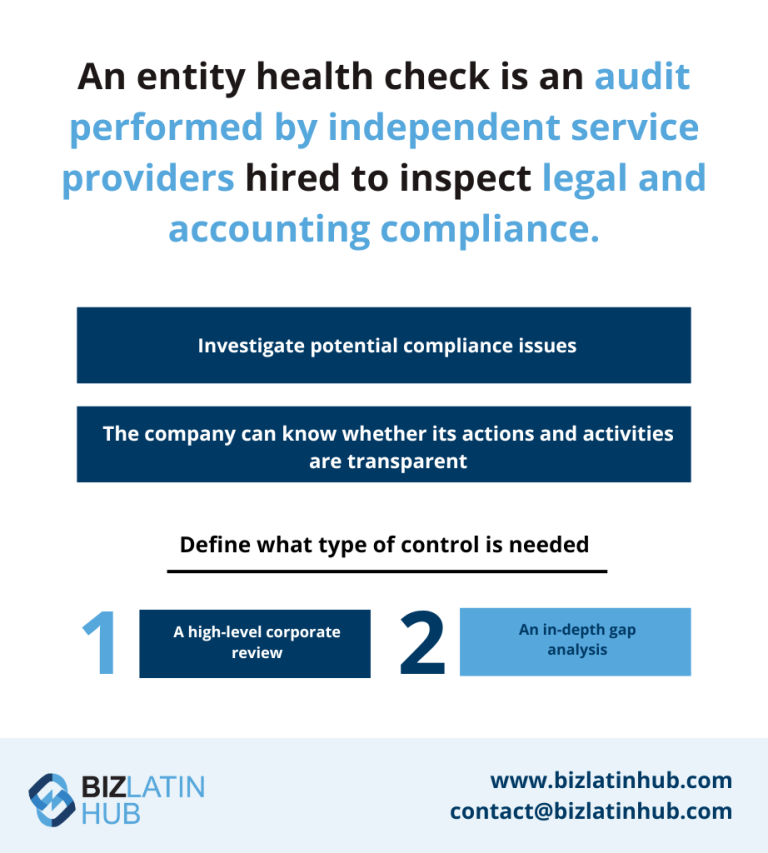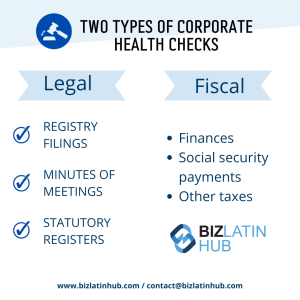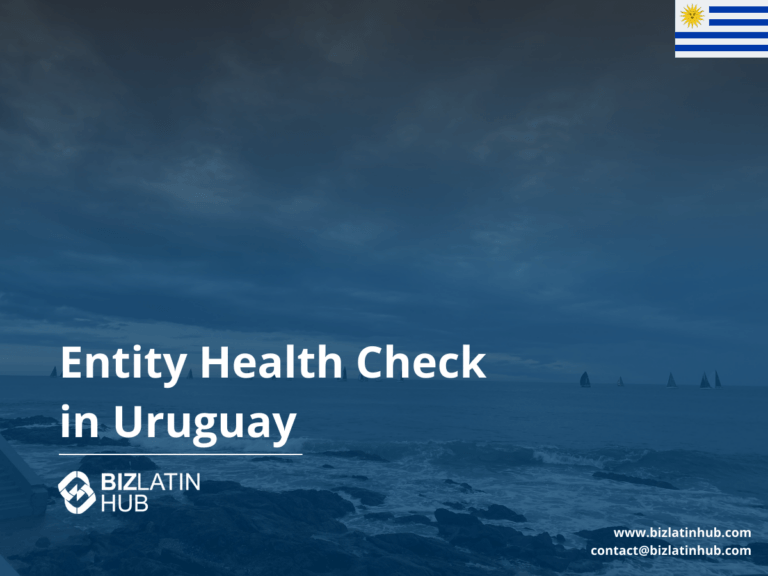An entity health check in Uruguay provides comprehensive verification of your company’s compliance status with local corporate laws. This corporate due diligence process protects your business from penalties and maintains your standing with Uruguay’s regulatory authorities.
Uruguay requires strict compliance with corporate, tax, and labor regulations. Companies operating in Uruguay face regular inspections from DGI (Dirección General Impositiva), BPS (Banco de Previsión Social), and MTSS (Ministerio de Trabajo y Seguridad Social). An entity health check ensures your business meets all requirements before authorities arrive.
Key Takeaways on Entity Health Check in Uruguay
| Topic | Key Information |
|---|---|
| Main compliance areas | Corporate structure, DGI tax obligations, BPS social security, labor law, data protection (Law 18.331) |
| Critical deadlines | Annual tax filings, monthly BPS payments, timely corporate book updates per legal requirements |
| Who needs health checks | All SAs and SRLs in Uruguay, foreign subsidiaries, companies with over 5 employees, M&A participants |
| Frequency recommended | Annual reviews for most companies, semi-annual for free zones, quarterly for financial services |
| Common violations | Late BPS payments, outdated shareholder registry, missing labor documentation, incomplete DGI filings |
| Cost-saving tip | Schedule health checks before fiscal year-end to align with annual filings and reduce professional fees |
What Is an Entity Health Check in Uruguay?
An entity health check examines your company’s legal, fiscal, and operational compliance in Uruguay. This Uruguay compliance check covers registrations with government bodies, tax filings, labor documentation, and corporate governance requirements.
Legal due diligence in Uruguay focuses on corporate book maintenance including Libro de Actas and Libro de Registro de Acciones, shareholder meeting documentation and resolutions, power of attorney validity and registration, commercial contracts and third-party agreements, and labor contracts with union agreement compliance. Each element requires specific attention to Uruguay’s unique legal framework and documentation standards.
Corporate due diligence in Uruguay includes comprehensive review of DGI tax registration and monthly filings, BPS social security contributions and declarations, IRAE corporate tax compliance, VAT declarations and payment schedules, and transfer pricing documentation for international transactions. These fiscal elements form the foundation of Uruguay compliance verification and directly impact your company’s operational continuity.
5 Essential Steps for Entity Health Check in Uruguay
1. Pre-Audit Document Collection
The first step requires gathering Uruguay-specific documents that prove your company’s legal existence and operational compliance:
- RUT (Registro Único Tributario) certification
- Complete BPS registration and payment history
- Corporate books certified by a notary
- Labor contracts registered with MTSS
- Financial statements approved by a licensed CPA
Document collection typically takes 5-10 business days depending on your internal organization and record-keeping practices.
2. Uruguay Compliance Verification
Compliance verification examines your adherence to Uruguay’s regulatory framework. This includes corporate transparency requirements, beneficial ownership registry regulations, personal data protection laws, and anti-money laundering (AML) requirements. Each regulation carries specific documentation requirements and reporting obligations that affect different aspects of your business operations.
3. Tax Compliance Review
Uruguay’s tax system requires careful review of multiple obligations. Your entity health check must examine IRAE payments and advance payments, IVA (VAT) monthly declarations, IRNR obligations for foreign shareholders, wealth tax for qualifying entities, and municipal taxes specific to Montevideo or other departments. Tax compliance forms the largest component of most entity health checks due to the complexity of Uruguay’s fiscal regulations and the severity of penalties for non-compliance.
4. Labor Law Compliance Check
Labor compliance in Uruguay involves verifying adherence to salary council (Consejo de Salarios) minimum wages, calculating vacation bonus (salario vacacional) correctly, ensuring proper year-end bonus (aguinaldo) provisions, maintaining work accident insurance (BSE) coverage, and respecting union rights and collective bargaining requirements. Uruguay’s strong labor protections mean that employment-related compliance often reveals the most violations during entity health checks.
5. Documentation and Reporting
The final step produces comprehensive compliance reports that include an executive summary in Spanish for local authorities, detailed action plans for identified gaps, realistic timelines for corrections typically ranging from 30 to 90 days, and cost estimates for compliance improvements. Professional reports provide clear roadmaps for achieving and maintaining compliance with Uruguay regulations.
Uruguay Entity Verification: Industry-Specific Requirements
Free Zone Companies
Free zone entities in Uruguay operate under special regulations that require annual audits by law, specific reporting to Free Zone authorities, verification of foreign revenue requirements, and documentation of substance requirements. These companies benefit from tax exemptions but face stricter compliance monitoring to ensure they meet operational requirements. The Free Zone regime requires maintaining detailed records of all international transactions and demonstrating that local sales remain within permitted limits.
Financial Services
Financial institutions face enhanced scrutiny from BCU (Central Bank) with specific reporting requirements, quarterly compliance certificates, regular AML/KYC documentation updates, and capital adequacy verification. The financial sector in Uruguay must demonstrate robust internal controls and maintain higher standards of documentation than other industries. Regular entity health checks help financial services companies prepare for BCU inspections and maintain their operating licenses.
Agricultural Businesses
Agricultural operations require specialized compliance including MGAP (Ministry of Agriculture) registrations, environmental compliance certificates, rural property tax (Contribución Inmobiliaria Rural) payments, and export permit validations. Uruguay’s agricultural sector faces unique challenges related to land ownership documentation, environmental impact assessments, and traceability requirements for exports. Entity health checks for agricultural businesses often reveal gaps in environmental compliance and export documentation.
Tips and Recommendations from Local Experts
Timing Your Health Check
Best practice suggests scheduling entity health checks well before fiscal year-end deadlines. This timing allows correction of issues before annual tax filings and reduces rush fees charged by professional service providers. Companies that conduct health checks with adequate lead time typically save significantly on professional fees compared to those requesting urgent reviews. Early detection of compliance issues also provides more time for remediation without facing penalty deadlines.
Documentation Management
Uruguay requires physical corporate books stamped by notaries, and digital copies alone don’t satisfy legal requirements. Maintain books at your registered office address and ensure they’re updated within 90 days of any corporate action. Many companies face penalties simply because their corporate books aren’t physically available during inspections. Create a documentation protocol that ensures all required stamps and certifications are obtained promptly.
BPS Compliance Strategy
Expert recommendation includes setting automatic BPS payments for the 5th of each month to avoid late payment penalties. Late payments trigger immediate penalties plus 3% monthly interest, and early payment avoids system delays common during peak processing periods. Establish a dedicated bank account for BPS payments to ensure funds are always available and payment records remain clear.
DGI Relationship Management
Respond to DGI information requests within 10 business days as extensions are rarely granted. Designate a tax representative (representante fiscal) for faster communication with authorities. Building positive relationships with DGI officials through prompt responses and professional communication can significantly ease future interactions. Maintain organized files specifically for DGI requests to enable quick response times.
Labor Documentation
MTSS inspections focus heavily on overtime records and safety documentation. Keep daily attendance logs and signed overtime authorizations for 5 years minimum. Create standardized forms for all labor-related documentation and train supervisors on proper completion. Many labor violations result from incomplete documentation rather than actual non-compliance with regulations.
Cost Considerations for Uruguay Due Diligence
Entity health check costs in Uruguay vary significantly based on company size and complexity. As a general guide, small companies with 1-10 employees might expect costs starting from USD 2,000, while medium companies with 11-50 employees typically see higher fees. Large companies with over 50 employees should budget accordingly for comprehensive reviews, with free zone entities often requiring additional specialized compliance review.
Cost factors include:
- Number of employees and contractors
- Transaction volume and complexity
- Presence of international operations
- Previous compliance history
- Urgency of the review
Companies with clean compliance histories and organized documentation typically pay lower fees due to reduced auditor time requirements. Establishing good documentation practices can reduce future health check costs significantly. For accurate pricing, consult with local professionals who can assess your specific needs.
When to Conduct Uruguay Compliance Checks
Mandatory Triggers
Certain business events mandate immediate entity health checks in Uruguay:
- Preparation for M&A transactions
- Receipt of foreign investment
- Applications for free zone status
- Banking facility applications
- Government contract bids
Each situation requires specific documentation and compliance verification to satisfy counterparty due diligence requirements. Failing to conduct proper health checks before these events can result in deal delays or failures.
Recommended Schedule
Regular health checks prevent compliance deterioration and reduce remediation costs. All active companies should conduct annual reviews, while companies with 50 or more employees benefit from semi-annual checks. Financial institutions and free zone companies require quarterly reviews due to regulatory requirements, and high-risk sectors including gaming and cryptocurrency operations need monthly compliance monitoring. Establishing regular review schedules helps identify issues before they become critical violations.
Common Compliance Failures in Uruguay
BPS declaration errors affect approximately 35% of companies during health checks. These errors include incorrect employee categorization, missing contractor declarations, and calculation errors in contributions. Many companies misclassify employees as contractors or fail to update employee categories when roles change, leading to significant underpayment of social security contributions.
Corporate book delays impact 28% of companies reviewed. Meeting minutes not transcribed within 90 days, missing notary certifications, and incomplete shareholder registries create legal vulnerabilities. Uruguay law requires timely documentation of all corporate actions, and delays can invalidate important business decisions.
DGI filing issues affect 22% of companies, primarily through late monthly IVA submissions, incorrect IRAE advance payments, and missing supporting documentation. Tax filing errors often compound over time, creating larger liabilities when eventually discovered. Electronic filing systems help reduce errors but require proper setup and maintenance.
Labor law violations found in 15% of companies typically involve overtime payment calculations, vacation record maintenance, and safety training documentation. Uruguay’s complex labor laws create numerous compliance traps for employers, particularly regarding overtime calculations and benefit accruals.
FAQs on Entity Health Check in Uruguay
How long does an entity health check take in Uruguay?
Standard reviews require 15-30 business days for completion. Complex multinational companies may need 45-60 days due to additional documentation requirements and international verification needs. Urgent reviews are available within 7 days at premium rates, typically 50% higher than standard fees. Timeline depends primarily on document availability and company cooperation during the review process.
Can foreign companies conduct their own entity health check?
No, Uruguay law requires local professional involvement for valid compliance verification. CPAs must certify financial reviews, escribanos (notaries) must validate corporate documents, and labor lawyers should review employment compliance. Foreign companies can participate in the process but cannot self-certify compliance. This requirement ensures familiarity with local regulations and standards.
What happens if violations are found during the health check?
You receive a detailed report containing violation descriptions with specific legal references, risk assessments categorized as low, medium, or high priority, correction timelines typically ranging from 30 to 90 days, estimated penalties if issues remain uncorrected, and step-by-step remediation plans. Most violations can be corrected without penalty if addressed promptly after discovery. The key is taking immediate action once issues are identified.
Are entity health checks confidential in Uruguay?
Yes, professional secrecy laws protect health check findings in Uruguay. Auditors cannot share information with authorities unless legally required by court order or specific regulatory mandate. Written confidentiality agreements are recommended to establish clear boundaries and expectations. This protection allows companies to identify and correct issues without fear of immediate regulatory action.
How much do penalties cost for non-compliance in Uruguay?
DGI tax penalties can range from minor percentages to significant surcharges on unpaid amounts, plus accrued interest. BPS violations often carry substantial surcharges on unpaid contributions. Labor infractions result in fines calculated in Unidades Reajustables (UR), with values adjusted annually for inflation. Corporate law breaches trigger penalties that vary based on severity and impact. Repeat violations face multiplied penalties and potential criminal charges for company directors. Specific penalty amounts depend on the type and severity of the violation, making compliance a cost-effective strategy compared to remediation.
Which Uruguay authorities might request entity verification?
Several Uruguay authorities may require entity verification:
- DGI – Conducts tax audits focusing on income tax and VAT compliance
- BPS – Performs social security inspections examining contribution calculations and payment histories
- MTSS – Reviews labor compliance including contracts, overtime, and safety standards
- BCU – Monitors financial institutions for regulatory compliance and systemic risk
- AIN (Auditoría Interna de la Nación) – Audits government contractors for public fund usage
Each authority has specific documentation requirements and inspection procedures.
Entity Health Check Types in Uruguay

Legal Due Diligence Uruguay
Legal entity verification in Uruguay encompasses comprehensive review of registry filings with RNC (Registro Nacional de Comercio), ensuring all corporate changes are properly recorded. Corporate governance compliance includes verification of board and shareholder meeting minutes, resolutions, and proper notification procedures. Statutory registers including share registry and director registry must be maintained according to legal requirements with proper notarization. Contract review covers all commercial agreements, leases, licenses, and employment contracts to ensure legal validity and compliance. Litigation checks search court records in Montevideo and relevant departments to identify potential legal risks or ongoing disputes that could affect business operations.

Fiscal Due Diligence Uruguay
Fiscal compliance verification requires examining all DGI filings for the past 5 years to ensure consistency and accuracy. BPS compliance history reveals patterns of payment timing and calculation methods that may require correction. Municipal taxes vary by location, with Montevideo having different requirements than other departments. Customs duties documentation becomes critical for import/export businesses to demonstrate proper valuations and classifications. Transfer pricing documentation must support all international transactions between related parties, following OECD guidelines adapted to Uruguay requirements.
Next Steps for Your Uruguay Entity Health Check
Professional entity health checks protect your Uruguay operations from costly penalties and reputational damage. Schedule your review with adequate time before regulatory deadlines to ensure thorough assessment and remediation opportunities. Early action provides time for comprehensive review and measured correction of any identified issues.
Important Note: This guide provides general information about entity health checks in Uruguay. Specific requirements, deadlines, and penalties vary based on your company’s structure, industry, and circumstances. Always consult with qualified local professionals for current regulations and requirements applicable to your situation.
Contact Biz Latin Hub for Uruguay Due Diligence Services
At Biz Latin Hub, our Uruguay team provides comprehensive entity health checks and due diligence services. Our local experts understand DGI requirements, BPS regulations, and MTSS compliance standards. We deliver actionable reports that protect your business interests.
Our Uruguay entity verification services include complete legal due diligence Uruguay, corporate due diligence Uruguay, Uruguay compliance check services, Uruguay entity verification and audits, and remediation support with implementation guidance. We work with your team to ensure sustainable compliance practices that prevent future violations.
Reach out to us now for your Uruguay entity health check consultation.
Learn more about our team and expert authors.





